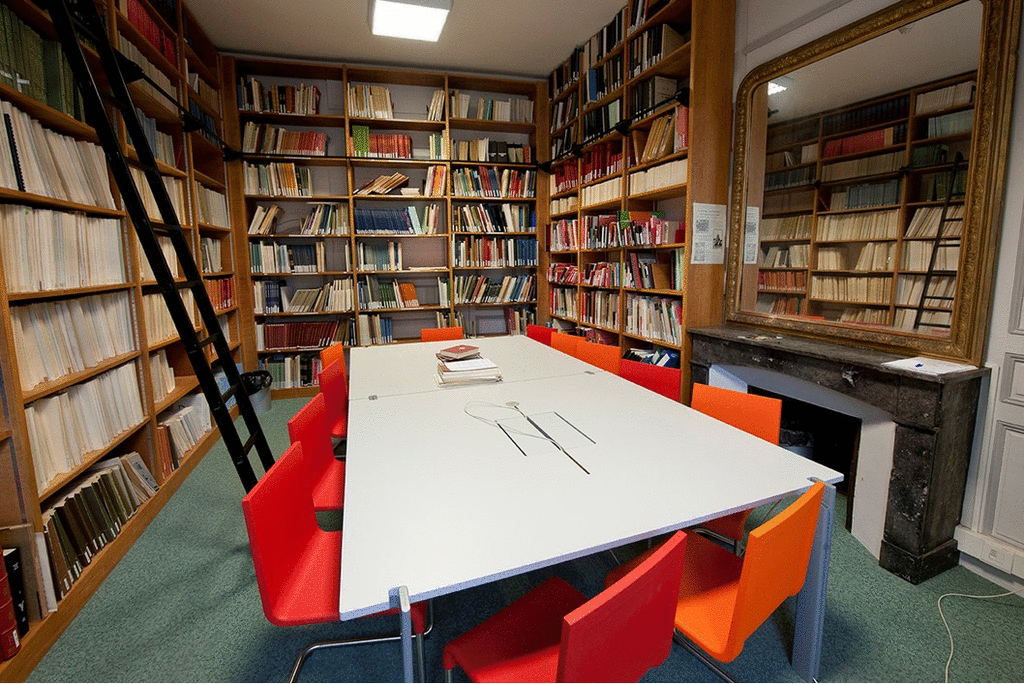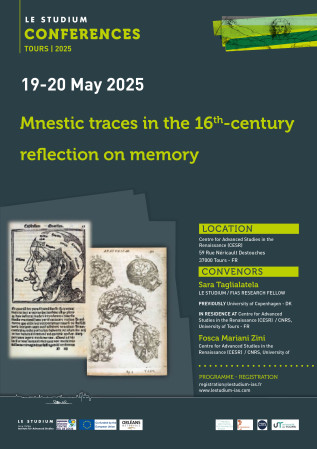Mnestic traces in the 16th-century
reflection on memory
Centre d’Études Supérieures de la Renaissance (CESR)
59 rue Néricault Destouches
37000 Tours
France
Presentation
The conference intends to explore the contribution of the 16th century to the elaboration of the notion of the mnestic trace by questioning not only the philosophical traditions from which the century of the Reformation and Counter-Reformation reflected on memory, but also by drawing attention to the innovations introduced as a result of the reorganisation of knowledge and the technological advancement that made possible the development of disciplines such as medical anatomy, for example.
The conference sessions will explore four thematic clusters:
1. The formation of mnestic traces: senses, emotions and memory. How are mnestic traces produced? What role do the senses and emotions play in the production of mnestic traces? What relationship exists between external experience and internal experience, between external senses and internal senses? What ensures coherence between external experience and the experience data stored in the mnestic trace?
2. The content of mnestic traces: on the relationship between memory and time. What is preserved in mnestic traces? Is what is retained contained in mnestic traces or is it remembered through them? How can the content of mnestic traces be recalled, thus making it available for other cognitive functions in the present and future? Is memory an operation performed by the memory faculty alone or does it imply the contribution of other faculties? Is there a causal relationship between the content of the mnestic trace and the individual's past experience? If there is no causal relationship with the individual's past experience, in what way is there a causal relationship between past experience, retention and recollection?
3. The location of mnestic traces: on the relationship between body and soul. Where are mnestic traces located, in the soul or in the body? What are the philosophical and scientific models for locating memory traces? What is the relationship between body and soul in 16th century theories of memory? What is the contribution of the development of anatomy as a medical discipline to the localisation of memory? Does the beginning of the physiologisation of cognitive faculties lead to changes in the conception of the mnestic trace and, consequently, in philosophical theories of memory?
4. Remembering without traces: criticism of the notion of the mnestic trace. What are the critiques of the notion of the mnestic trace that develop in the 16th century? In what field of research do they arise, what traditions of reflection on memory do they refer to and how are they shaped? Are alternative reflections and theorisations on memory proposed, i.e. which do not make use of the notion of the mnestic trace? What are the characteristics of these theories and, in particular, how do they solve the problems of the causal relationship between memory and the past and the relationship between soul and body?
The conference will bring international experts on theoretical philosophy, history of philosophy, history of medicine, and musicology to CESR, the venue of the conference and a renowned interdisciplinary center for the history of Middle Ages and Renaissance.
The two day event will contribute to contaminate the R&I ecosystem of the Le Loire Valley and of CESR by promoting the discussion on an aspect of the history of philosophy which has an undeniable impact on the contemporary understanding and reflection of the notion of memory. Given the importance of the notion of memory in many contemporary fields of research (neurosciences, psychology, medicine, sociology, ...), the conference will offer to the researchers of the region working in these disciplines the opportunity to reflect on the historical background of their researches.
CONVENORS
- Sara Taglialatela, LE STUDIUM / FIAS Research Fellow
PREVIOUSLY University of Copenhagen - DK
IN RESIDENCE AT Centre for Advanced Studies in the Renaissance (CESR) / CNRS, University of Tours - FR - Fosca Mariani Zini,
Centre for Advanced Studies in the Renaissance (CESR) / CNRS, University of Tours - FR
Location
The conference venue is unique. Located right next to the basilica of St Martin in the old city centre of Tours, the Centre d'Études Supérieures de la Renaissance (Centre for Advanced Studies in the Renaissance) is a teaching and research institution which welcomes students and researchers seeking initial or supplementary instruction in all aspects of the Renaissance. The Centre was initially constituted in 1956 on the basis of a library and a documentary archive, supplemented by a collection of photographs and databases. It is now a venue for multi-disciplinary instruction, which, in association with the various Faculties of the University, has responsibility for teaching and research in History, History of Art, Literature, Languages, Musicology, and Philosophy. It currently leads a large research programme dedicated to the cultural regional heritage (Intelligence des Patrimoines). As a research centre it brings together fifty or so researchers committed to the investigation of the "civilization of the Renaissance" from Petrarch to Descartes. Participants will be welcomed in this exceptional surrounding blending Middle Age and Renaissance cultures and will have the opportunity to discover French cuisine and wines.
General Information
| Congress Venue |
Centre d’Études Supérieures de la Renaissance (CESR)
59 rue Néricault Destouches - 37000 Tours, France
| Dates |
Monday 19 May and Tuesday 20 May 2025
| Language |
The official language of the Congress is English
| Welcome pack and Name Badge |
Upon arrival you will receive a welcome pack that includes the printed material of the Conference and your name badge will be given to you at the reception . Please wear your name badge at all times during the Conference and to all official Conference events.
| Invitation Letters |
An official letter of invitation facilitating the obtention of an entry visa can be sent upon request . In order to receive an invitation letter for visa purposes, send an email to maurine.villiers@lestudium-ias.fr. Please note that :
- we only issue an official letter once the payment of the registration fee has been validated.
- such letters do not represent a commitment on the part of the Organisers to provide any financial assistance.
| Certificate of attendance |
After the conference, in order to receive a certficate of participation, send an email to maurine.villiers@lestudium-ias.fr
How to get there ?
![]()
By train:
* Tours centre station
1.5 hour trip from Paris (Montparnasse)
* Saint Pierre des Corps (4km from Tours town centre)
Bus 5, 20 minutes trip to Tours centre station
> Plan your trip by train: https://www.sncf-connect.com/en-en/
![]()
By car:
GPS: 47.3918282,0.6823076
Please note that you can't park in the courtyard in front of the CESR.
Paid car parks nearby :
Parking Indigo Tours Halles Vieux Tours, 36 Place Gaston Paillhou, 37000 Tours
Parking Gambetta, 8 Rue Gambetta, 37000 Tours
Parking Indigo Tours Nationale, 5 Rue Emile Zola, 37000 Tours
![]()
By plane:
*Arrival at Roissy Charles De Gaulle (CDG) airport:
Take RER B in direction to Saint Rémy Les Chevreuse, step out at Denfert Rochereau Stop
Take Metro 6 in direction to Kleber, step out at Montparnasse Bienvenue Stop for Montparnasse train station
or
Take RER B in direction to Saint Rémy Les Chevreuse, step out at Gare du Nord Stop
Take Metro 5 in direction to Place d'Italie, step out at Gare d'Austerlitz Stop for Austerlitz train station
> Then take a train to Tours (see "by train" section above)
*Arrival at Paris-Orly (ORY) airport:
Take Metro 14 in direction to Saint-Denis - Pleyel, step out at Kleber Stop.
Take Metro 6 in direction to Kleber, step out at Montparnasse Bienvenue Stop for Montparnasse train station
or
Take Metro 14 in direction to Saint-Denis - Pleyel, step out at Bibliothèque-François Mitterrand Stop.
Take RER C in direction to Gare de Pontoise, step out at Gare d'Austerlitz Stop for Austerlitz train station
> Then take a train to Tours (see "by train" section above)









